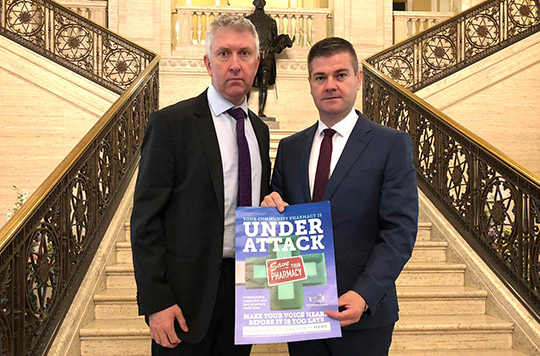South Down MLA Colin McGrath has met with lobbyists from Community Pharmacy NI to discuss possible extra funding and resources for rural pharmacies in towns across Northern Ireland following a recent announcement from the Department of Health.
Expressing his concerns about the threats to local pharmacies, the South Down MLA said: “This is coming about due to the increasing pressures on GP’s and accident & emergency services and the vital need for medicines and medical services in rural pharmacies.
“Parity tariffs implemented here in Northern Ireland from England are causing rural pharmacies to pay higher rates for more drugs and are in turn making them close down as they are struggling to meet payments back on the drugs.
“While funding has been reduced by 20% over the past 12 months, the workload and workforce pressures have continued. This has taken a heavy toll on these rural pharmacies.

“The SDLP believe that those who live in rural towns and villages should NOT have to travel large distances to more urban areas to access the medication and services they need when they are either financially or physically unable to.
:Equally we believe that those with jobs and businesses in these rural areas should not have to lose them and an increase in funding and services for these rural pharmacies would go a long way to helping these causes and reducing A&E wait times or pressure on GPs.“
Community Pharmacy NI Responds To Department Announcement
Reacting to the announcement by the Department of Health in June this year that the Department is to invest £4.54million in the Practice Based Pharmacist scheme as part of an overall investment of £8.8million in GP services in Northern Ireland, Gerard Greene, Chief Executive of Community Pharmacy NI said: “While investment in primary care is to be welcomed, this is the wrong investment, at the wrong time, to the wrong part of the health service.
“We hear time and again that GP practices are overstretched with patients and that the work load is simply far too much for the number of practices. This situation is mirrored in Community Pharmacy, but the Community Pharmacy sector is also facing a £20m plus reduction in funding this year.”

“There is a developing crisis in Community Pharmacy which has to be prioritised right now for Departmental investment in order to safe-guard vital patient services. To direct investment elsewhere in primary care at this time defies logic.”
“The Department are acutely aware of the crisis in Community Pharmacy and are choosing to ignore our repeated calls for urgent emergency investment. Without an immediate similar investment in community pharmacy to stabilise the sector now, our General Practitioner colleagues will simply see more and more patients being pushed into the bottlenecks that exist in GP surgeries, making the situation worse for both Community Pharmacists and GPs.”
“Community pharmacy needs to be given a more proactive role in public health and in the prevention and management of long term conditions. This is a view that is reflected strongly in both Bengoa and Transforming Your Care reports and endorsed by the previous Health Minister. This is the answer to alleviating the regular pressure points that build up elsewhere in the health system. As contractors, we are best placed to deliver community-based healthcare services and promote well-being.”
“Community pharmacy unlike general practice is not appointment led, therefore it is important that there is an investment in this service so that it can continue to offer unrestricted access to the health service, particularly in rural areas like Fermanagh, where we know that half of the GP practices have disappeared in the last year. Around 123,000 people visit a community pharmacy every day so we acutely aware of just how much pressure is out there.
“A more co-ordinated approach to this across general practice, community pharmacy and other health providers is therefore crucial.”
























